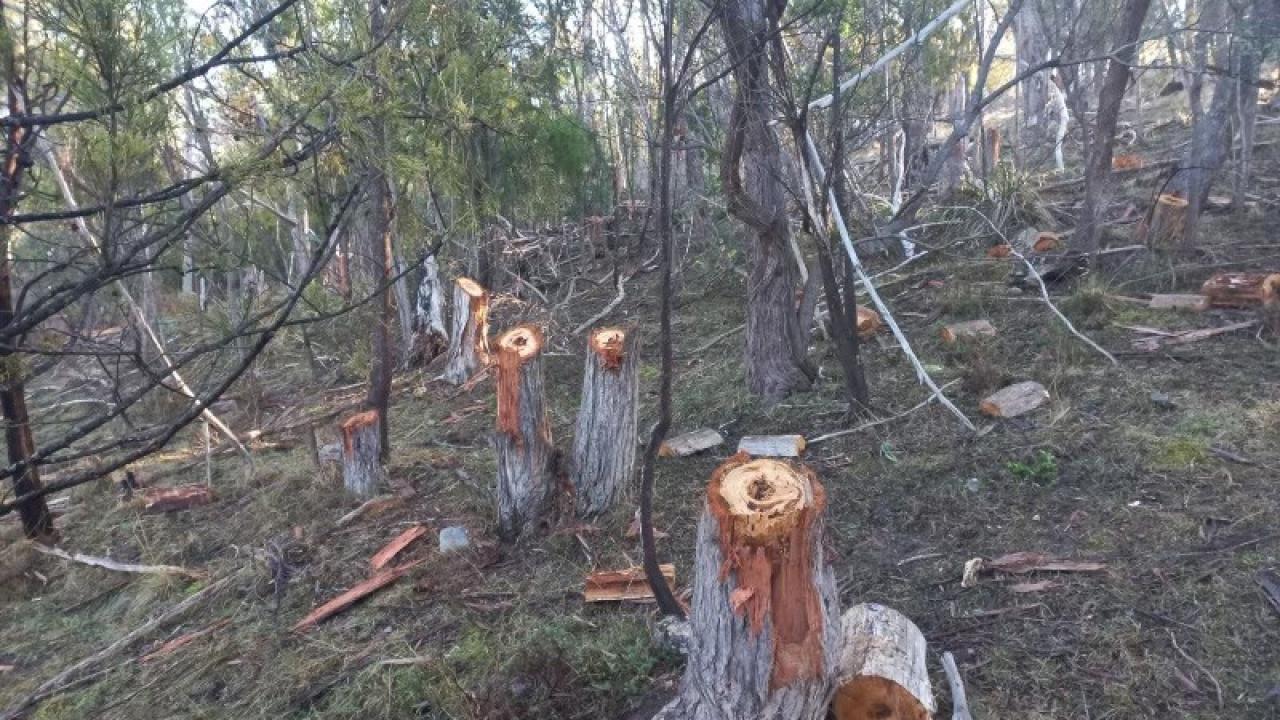The burning question of rouge woodhooking

Government organisations and firewood businesses are alarmed by the increase in people illegally cutting down trees on private and crown land.
Bothwell resident and firewood stocker Roger Bartels says that Facebook Marketplace is littered with people selling illegally sourced timber, an act which is commonly referred to as woodhooking.
In June, nine people from Queenstown were arrested and charged after police seized more than 200 tonnes of illegally harvested firewood during a joint operation with Sustainable Timber Tasmania (STT).
Sydney businessman and Tasmanian property developer Sam Saliba recently visited his 6ha property in Claremont to find 30 sizeable trees cut up for firewood without his knowledge.
“I had never heard of wood hooking and couldn’t believe someone would trespass to steal the trees for firewood,” he said.
“It’s affected the rural aspect of the property and it looks so much more sparse than before.
“Most of the wood has gone but there was some left behind so the offenders obviously intended on coming back.”
Mr Saliba reported the incident to Glenorchy City Council and investigations are ongoing.
Tasmanian laws state that the public can only harvest timber from their own property unless they have permission from another landowner or a permit from STT.
Mr Bartels had been selling firewood for 10 years but recently decided to stop, mainly due to the prevalence of woodhooking.
“The majority of people selling wood on Facebook Marketplace have got their partner or their girlfriend listing it and they are offloading the wood at ridiculous prices for the size of it,” he said.
“You’ve got people selling loads of it for $300, which is lucky to be a metre-and-a-half, and people selling tonnes of wet wood.
“You’ve got people selling cubic metres and half of them can’t even measure what a cubic metre is.”
Mr Bartels had been selling firewood that had been sourced from his property in the Central Highlands.
“I sell it at a reasonable price, at a stacked measurement and I make it clear to people what the quality of the wood is,” he said.
“I also tell them their best option is to get wood in the summer and that they should store it undercover so that it’s dry and there is no smoke coming out of the chimney when you burn it.”
Mr Bartels said Tasmania’s black market for firewood was now the most widespread it had been.
“It’s gotten to the point where I’m not doing wood anymore – it’s simply not working.
“You’ve got people that will message you and say I want a load of wood, but then they’ll turn around and say they got it from someone else.
“It’s just a ridiculous situation.”
STT Operations General Manager Stephen Rymer said that while the organisation does not keep records of how much timber has been stolen from its lands and the financial implications of it, he acknowledged that woodhooking was a big issue for the organisation.
“It’s hard to put a price on in a dollar sense, but we know that there’s a large amount of it going on and there’s a whole lot of impacts economically for us in terms of lost revenue,” Mr Rymer said.
“I’m always hearing reports from my staff of new areas where people are woodhooking.
“Areas closer to the bigger population centres are more impacted, but it’s an issue all across the state.”
Mr Rymer said the cost of living, along with more reporting and prosecutions by authorities, were the likely reasons why woodhooking was becoming more widespread.
“We work closely with a number of other agencies - including Tasmania Police, the Environment Protection Authority and the Tasmania Parks and Wildlife Service (PWS) - to respond to illegal theft of firewood.
“We use techniques such as surveillance cameras, drones and targeted patrols to catch offenders, along with reports from members of the public that we follow up on.”
PWS Landscape Programs General Manager Andrew Harvey said the impact of woodhooking went beyond just stealing timber.
“These guys drive off-road through reserves and create tracks, which creates a whole range of flow-on effects from that, including the spread of Phytophtora – a genus of plant-destroying water moulds - and weeds,” Mr Harvey said.
“I’ve also seen some dubious practices in relation to the cutting of the timber where they have hung-up trees because they haven’t felled them properly and they’ve landed in other trees - it is very dangerous.
“I’ve also seen stumps where the tree is split and it’s clear it has fallen back towards them, which is a concern from a safety perspective as well.”
Penalties for cutting down trees illegally on crown land include fines of up to $86,000 and two years' imprisonment.




Add new comment